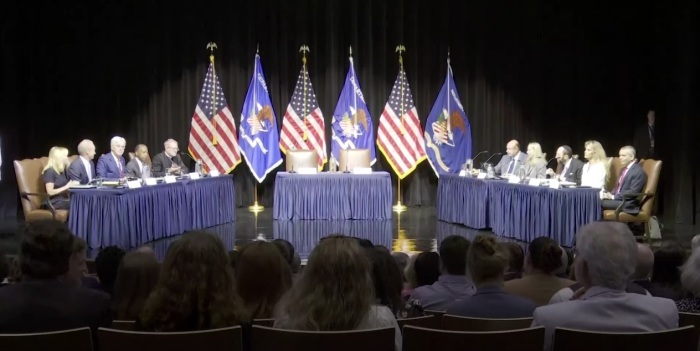
The biggest threat to religious liberty in the United States is secularist groups that are trying to wield the government to stamp out views, according to a professor.
Texas Lt. Gov. Dan Patrick chaired the inaugural meeting of the Presidential Commission on Religious Liberty last Monday at the Museum of the Bible in Washington, D.C.
Panelists included former U.S. Housing Secretary Dr. Ben Carson and TV talk show host Phil McGraw, along with remarks from faith leaders, scholars, and legal experts on the foundational role of religious liberty in American society.
Patrick said the panel’s two roles were “to advise and report to the president.” He added, “The Presidential Commission does not report to Congress, but the findings from our committees will be reported to the president to see what action would happen after that.” He also urged the panel to “contend earnestly for religious liberty.”
U.S. Attorney General Pam Bondi also addressed the commission, saying, “Our Founding Fathers understood that every individual must be free to worship without fear, without coercion, and without government interference.”
Witnesses, including Mark Rienzi, a professor at The Catholic University of America, Columbus School of Law, and Notre Dame law professor Gerald Bradley, provided testimony on the historical and legal significance of religious freedom, highlighting its roots in the founding era and challenges posed by modern judicial interpretations.
Citing the “fervent religious belief” of the Puritans against the Quakers and other Christian groups, Rienzi said the focus of defending religious freedom has changed from intra-religious Christian disputes to attacks on religion itself from atheists and other secular groups.
“These days, frankly, I don’t think it so much comes from religious people trying to use government to stamp out people with unpopular views,” he said.
“I think it’s now more often anti or irreligious folks who want to wield the government to stamp out views that are wrong. And I think the truth is, whether it’s the religious people or the opponents of religion, it’s wrong.”
Bradley pointed to James Madison’s 1785 pamphlet against a Virginia tax for ministers, a document he coined the “Magna Carta of American religious liberty,” in which Madison called religious liberty not just a “right towards men” but a “duty towards the Creator.”
“Central to religion is one’s conscientiously judging what is the case about ultimate matters and then acting accordingly,” said Bradley. “This obviously can only happen if people are free of coercion and manipulation.”
Paula White-Cain, who Trump appointed to lead the White House Faith Office earlier this year, warned about the diversity of recent threats to religious liberty, from “de-banking” to attacks on churches and other houses of worship.
“Employees have been fired over their faith. Religious entities have been de-banked, parental rights have been violated,” she said. “Who would have ever thought that in the very beginning, President Trump would have to pardon 23 pro-lifers for standing outside of an abortion clinic and praying silently?”
In response to the meeting, the secular group Americans United for Separation of Church and State claimed that the commission’s true “goal is to promote Christian nationalism, not true religious liberty.”
Americans United CEO Rachel Laser, who attended the meeting, criticized the decision to hold it at the Museum of the Bible and accused the government of catering to “white Christians.”
“From the setting at the Museum of the Bible to the political appointees to the speakers invited to testify, it’s clear this commission was created to advance the myth that the United States was founded for white Christians and that our laws and policies must continue to favor their beliefs,” Laser argued.
Established by a May 1 executive order by President Donald Trump, the commission plans to hold as many as nine hearings through 2026 to gather data and develop long-term strategies to protect religious liberty for all Americans, according to officials.

















